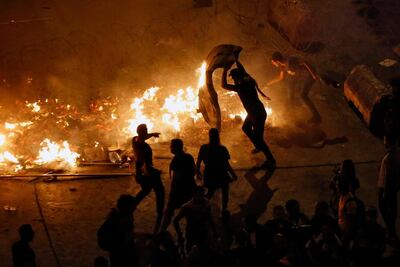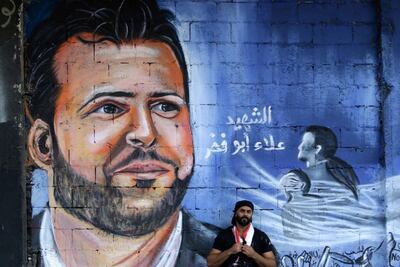Violence flared in Lebanon after a televised interview with President Michel Aoun on Tuesday evening in which he said: "If they do not like any person in authority, let them emigrate."
Anti-government protesters, who had begun to dismantle roadblocks in place since early November, burnt tyres and blocked motorways again.
A man was killed and several more wounded by a gunman in two incidents near Beirut. Schools, universities and banks remained shut.
“Who does he want to keep in Lebanon?" asked Marie-Therese Zouein Tabet, 65, who joined protesters near the Presidential Palace on Wednesday.
"Old people and militias? Is that what he wants?”
Calling people to emigrate touched “a raw nerve”, said Maha Yahya, director of the Carnegie Middle East Centre.
“Students had joined protests for the past two weeks to say that they do not want to emigrate to find a job," Ms Yahya said. "Their parents also want a future for their children in Lebanon.”
Mr Aoun also said that his son-in-law Gebran Bassil, one of the people most reviled by protesters, could be part of the new government.
The government has yet to confirmed since Prime Minister Saad Hariri’s resignation on October 29.
“People felt irrelevant," Ms Yahya said.
Despite protesters’ demands for a new government of specialists independent from politicians, Mr Aoun repeated that he wanted a “semi-political, semi-technocratic government” because “technocrats cannot define the country’s policy".
The outrage caused by the interview reinvigorated protesters.
Their numbers in Beirut had dwindled to a few dozen before Mr Aoun’s comments, but hundreds turned up near the Presidential Palace the next day.
One of them was held in custody overnight for insulting the president.
"Roads had been progressively reopened as a gesture of good will from the revolutionary citizens," Melissa Fathallah, who has been active in protests, told The National.
“People needed to rest, analyse and understand what was going on.
"But breath can only be held for so long and with the last speech given by the failed President Michel Aoun, people returned to the streets.”

The crowd near the palace on Wednesday was smaller than in the first days of the uprising, when analysts estimated that between 1 million and 2 million took to the streets around the country.
Despite their anger, protesters did instigate the violence in the past two days, Lebanese historian Makram Rabah said.
“The rage on the street was certainly caused by President Aoun’s speech," Mr Rabah said.
"But violence was perpetrated by pro-government factions, primarily the president’s party, the Free Patriotic Movement, and security forces who think they can bully people,” Mr Rabah said.
Local media reported that a man who had attacked protesters Jal El Dib, north of Beirut, made a hand gesture signifying allegiance to the party, which denied it.

The killing on Tuesday evening of Alaa Abou Fakher, a father of three, by a member of the army intelligence south of Beirut angered people from his hometown of Choueifat.
They blocked roads with burning tyres and rubbish containers on Thursday morning as Abou Fakher, 38, was laid to rest.
Roadblocks were also set up in the rest of the country but the army reopened most of them on Thursday afternoon.
Alhough the circumstances of his death remain unclear, Abou Fakher was the first protester to be killed by a member of the military since protests began.
Four other people have died in accidents or in brawls related to the demonstrations since October 17.
“There are plenty of opportunities that violence might increase further,” Ms Yahya said.
Mr Aoun has repeated that he is open to meeting protesters, but they have refused to appoint leaders up to now.
“We invited them to meet to talk together but I have not received an answer,” he said on Tuesday.
Mr Aoun promised that the new government would implement their demands, which have focused on eliminating corruption and nepotism.
On Thursday, he announced the new government could be formed within days after "obstacles" were removed.
But protesters said their trust in their leaders’ promises had been broken.
“Seeing is believing and each day is a new mind game,” Ms Fathallah said.










